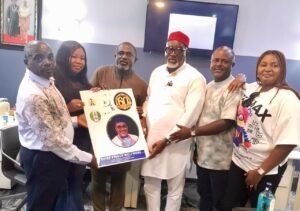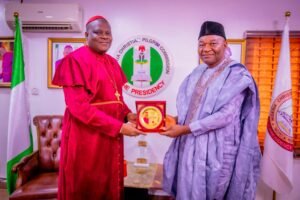Deputy Speaker, stakeholders recommend multi disciplinary measures to address insecurity
By Bridget Ikyado
The Deputy Speaker of the House of Representatives, Rep. Benjamin Kalu has recommended multi disciplinary approach to address the lingering insecurity in the country.
Kalu made the recommended at a round table discussion of stakeholders on ‘Conflict-Sensitive Strategies to Address Insecurity’ organised by Vision Africa in Abuja in collaboration with the International Dialogue Centre, popularly known as KAICIID, on review of laws/legislations to improve peace for the promotion of peace.
The deputy speaker said that Nigeria needed to take a comprehensive approach to addressing these security challenges.
“This means using a variety of tools, including law enforcement, military action, key non-kinetic measures, and conflict-sensitive development programming.
“Laws and legislation can play an important role in improving peace and addressing insecurity. For example, we have strengthened our laws against terrorism and banditry in recent times.
We also need to pass more laws, resolutions and motions that promote social justice and economic opportunity, which can help to reduce the root causes of conflict.
“We must also find ways to manage our diversity in a way that makes it a source of strength rather than a vehicle for conflict. Nigeria is a multi-ethnic, multi-religious, and multi-cultural country.
“This diversity is our strength, but it can also be a source of conflict. We need to find ways to manage our diversity and to use it to build a stronger and more united country,” he said.
The lawmaker said that government must be committed to implementing the laws and legislations passed by the parliament.
Kalu said that government must also work to build trust in the people, so that they are more likely to support the efforts to address insecurity.
According to him, we need to invest in conflict-sensitive development programming which can help to address the root causes of conflict and build peace.
In his remarks, Chief of Defence Staff, Maj.-Gen. Christopher Musa said there was need to review of legislations to improve peace and security in the country.
Represented by the Director, Civil Military Relations, Air Vice Marshal Anthony Idache, Musa said that the contemporary security challenges needed more stringent laws to deter violators.
He said there is need for Border Security Act to support the Nigeria Customs Service Act, a Radicalisation Act to cominalise radialisation and special courts for terrorism related cases for speedy judgment
He said there is need for Negotiation Act to prohibit all forms of negotiation with terrorist in whatever form or medium or speaking on their behalf.
Musa reiterated the determination of the Armed forces to secure Nigeria and work towards bringing improved security and eliminating criminal elements that have confronted the nation.
He recalled past efforts at tackling insecurity, and noted that the armed forces, more than any other time, are committed to the defence of the nation and assist in ensuring internal peace and security.
Also speaking, Kaduna-based Islamic cleric, Sheikh Abubakar Gumi, identified injustice as the major cause of terrorism and banditry as he called on Nigerians to task politicians and security to do their jobs.
He described perpetrators of terror attacks as victims of injustice and called for peaceful negotiation with these criminal elements living in the forest to embrace peace and be given amnesty as was done to Niger Delta militants.
Gumi said there was need for every single Nigerian and institution to reevaluate lifestyle in line with moral principles.
He said that there was need for every Nigerian to be given a sense of belonging and given access to education, healthcare and other social amenities.
He said that corruption especially misappropriation and embezzlement of funds meant for all is the root cause of insecurity.
Gumi said most bandits are forced into the crime for survival as they cannot afford basic necessities of life.
The cleric said that there was need to overhaul the security architecture of the country saying that about nine trillion has been spent on security since 2015, yet no security.
Earlier, the President of Vision Africa Bishop Sunday Onuoha who facilitated the round table said that the initiative was developed in collaboration with the KAICIID Dialogue Centre.
He said that the task was collaboratively deliberate on workable and effective strategies that are sensitive to the already fragile security state.
The bishop said that there was need to address the complexities and enhance collective peace via an assessment of laws and relevant legislations that can be improved upon or implemented.
”I will however, urge us all to concentrate on exceptional issues that are integral and common to us all, but especially to our young demographic; because the core essence of this is to give the younger generation hope, because whatever we do as leaders will rub-off on them.
“We have a young generation that is quickly losing hope in its leadership, and the concern is that if we don’t address these lingering issues now, no military might can manage the revolts of their collective frustrations.
“I am assured that our deliberations will be robust, and that your recommendations will embody the greater aspirations of the communities we represent, as we contribute our quota to posterity,” he said.
The Bishop noted that nothing should be left to chance in the search to improve peace and security in Nigeria for the sake of future generation.
He further called on leaders and stakeholders in the Nigerian State to collectively identify and evolve effective strategies to combat insecurity and other forms of conflicts bedeviling the country.
“I will however, urge us all to concentrate on exceptional issues that are integral and common to us all, but especially to our young demographic; because the core essence of this is to give the younger generation hope, because whatever we do as leaders will rub-off on them.
“We have a young generation that is quickly losing hope in its leadership, and the concern is that if we don’t address these lingering issues now, no military can manage the revolts of their collective frustrations,” the President of Vision Africa said.
A member of the House of Representatives, who represents Damboa/Goza/Chibok, Hon Ahmad Jaha declared that the National Assembly has done everything within its power of appropriations for the Armed Forces were adequate, backed up with 100 percent release of funds.
He abolsved the lawmakers of any form of dereliction, noting that “We have done our job by appropriating required funding for the Armed Forces.
“What we should be asking is that have the armed forces done what they were expected to do with the funds? The problem we must tackle here is that, after appointing security chefs, we should set them targets and deadlines for meeting such targets.
“If they fail to achieve such targets, we should then ensure there are consequences to be faced. So, it is not enough for security chiefs to be appointed, but we must ensure they are given targets and monitored to meet the targets of their appointments”.
The spokesman of the Department of State Services (DSS), Dr Peter Afunanya, called on Nigerians to appreciate the sacrifices of the country’s secret police in confronting terror groups and elements that sometimes lead to the killing of their personnel.
“Three children of our personnel were once killed in the presence of their mother in order to cause mental trauma for both her and her family members. This is just a case that we witnessed as risks involved in fighting criminal elements,” the spokesman said.
Chairman of the Middle Belt Forum, Dr Pogu Bitrus, who was represented by the Deputy National Secretary, Barrister Ejembi Aba, described what he called as the mischaracterization of the conflict confronting the nation.
He insisted that it was only appropriate for the conflict to be portrayed as deliberate efforts by criminal herdsmen armed to the teeth to take over ancestral lands of the indigenous people of the Middle Belt Region and other zones.
“What is happening in the Middle Belt Region is not herder/farmer’s clashes but a ploy by criminals using sophisticated weapons to unleash terror and destruction of unimaginable proportion,” the MBF president noted.
Chief Edwin Clark, who is the leader of the Pan Nigeria Delta Development Forum (PANDEF), called for restructuring of the country, insisting that only when regions are allowed to own resources of their regions can peace be realised.
Represented by Chief Ominimini Obiuwevisi, the PANDEF Leader wondered why petroleum resources from the South are treated as belonging to the Federal Government, but solid minerals in the North are not for the collective treasury. For security and peace to be entrenched in the country, justice and equity must be entrenched, Clark added.
Dr Akin Fapohunda, who represented the Afenifere Leader, Chief Ayo Adebanjo, suggested the country should emphasize the country’s regions as economic zones. In his words: “We should go back to 1960 where we recognize our differences. The grassroots must work to ensure recognition of ethnic and economic zones”.
Former Executive Secretary of National Health Insurance Scheme (NHIS), Professor Usman Yusuf, lamented that the failure of elders in the country has given way for the brigandage and violence being witnessed in Nigeria. He called on stakeholders to embrace peace and negotiate a way out of the present gloom and crisis Nigeria finds itself.
President of the Christian Association of Nigeria (CAN) His Eminence Archbishop Daniel Okoh, welcomed the initiative for finding peace and improving security in the country. He said that considering the varied views expressed at the event, it is good for such engagements to be sustained at all times.
Imam Fuad Adeyemi, who represented the Sultan, His Eminence Alhaji Muhammadu Sa’ad Abubakar III, expressed hope that the roundtable would go a long way in broadening frontiers of understanding in mobilising collective action towards tackling insecurity and other criminal activities confronting the nation.
Nigeria’s KAICIID Country Expert, Mr. Joseph Atang, commended participants for their insightful views and noted that all views were centred towards making the country overcome its security challenges. We believe this roundtable has provided yet another opportunity to understand and advance the dialogue towards peace building for greater nationhood.




